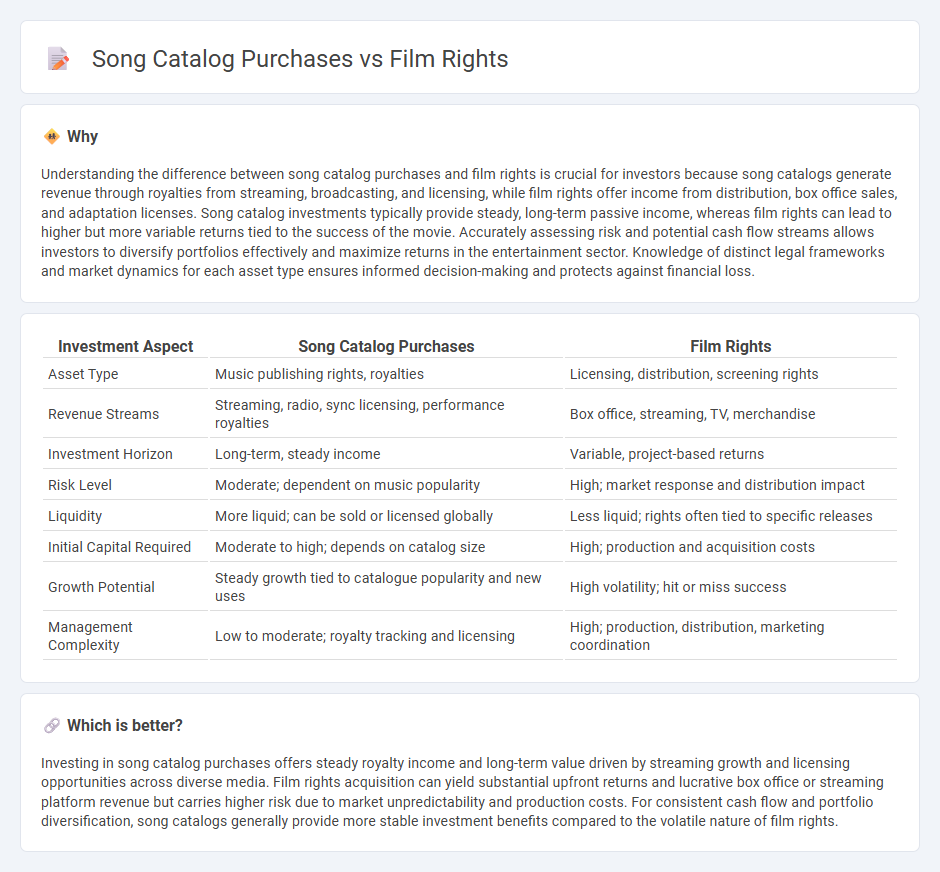
Investment in song catalog purchases offers steady royalty income and potential for long-term appreciation, appealing to those seeking passive revenue streams. Film rights investment, on the other hand, involves higher risk with possible blockbuster returns through licensing and distribution deals. Explore the advantages and challenges of both to make informed investment decisions.
Why it is important
Understanding the difference between song catalog purchases and film rights is crucial for investors because song catalogs generate revenue through royalties from streaming, broadcasting, and licensing, while film rights offer income from distribution, box office sales, and adaptation licenses. Song catalog investments typically provide steady, long-term passive income, whereas film rights can lead to higher but more variable returns tied to the success of the movie. Accurately assessing risk and potential cash flow streams allows investors to diversify portfolios effectively and maximize returns in the entertainment sector. Knowledge of distinct legal frameworks and market dynamics for each asset type ensures informed decision-making and protects against financial loss.
Comparison Table
| Investment Aspect | Song Catalog Purchases | Film Rights |
|---|---|---|
| Asset Type | Music publishing rights, royalties | Licensing, distribution, screening rights |
| Revenue Streams | Streaming, radio, sync licensing, performance royalties | Box office, streaming, TV, merchandise |
| Investment Horizon | Long-term, steady income | Variable, project-based returns |
| Risk Level | Moderate; dependent on music popularity | High; market response and distribution impact |
| Liquidity | More liquid; can be sold or licensed globally | Less liquid; rights often tied to specific releases |
| Initial Capital Required | Moderate to high; depends on catalog size | High; production and acquisition costs |
| Growth Potential | Steady growth tied to catalogue popularity and new uses | High volatility; hit or miss success |
| Management Complexity | Low to moderate; royalty tracking and licensing | High; production, distribution, marketing coordination |
Which is better?
Investing in song catalog purchases offers steady royalty income and long-term value driven by streaming growth and licensing opportunities across diverse media. Film rights acquisition can yield substantial upfront returns and lucrative box office or streaming platform revenue but carries higher risk due to market unpredictability and production costs. For consistent cash flow and portfolio diversification, song catalogs generally provide more stable investment benefits compared to the volatile nature of film rights.
Connection
Song catalog purchases and film rights are interconnected through their shared intellectual property assets, allowing investors to capitalize on multiple revenue streams such as royalties, licensing, and synchronization fees. Acquiring song catalogs enhances the value of film rights by providing music content that can be integrated into movie soundtracks, thereby boosting audience engagement and generating additional profits. This strategic alignment enables diversified investment portfolios in entertainment, combining music royalties with film distribution and exhibition revenues.
Key Terms
Intellectual Property
Acquiring film rights involves securing the legal permissions to produce, distribute, and monetize visual content based on existing works, emphasizing copyrights related to scripts, characters, and storylines. Song catalog purchases entail ownership of musical copyrights, including composition and publishing rights, enabling revenue from licensing, streaming, and royalties across various platforms. Explore the complexities and strategic benefits of intellectual property management in entertainment to understand the true value behind these acquisitions.
Royalties
Film rights acquisitions generate royalties primarily through box office sales, streaming licenses, and distribution deals, offering a mix of upfront payments plus ongoing percentage-based income. Song catalog purchases yield royalties from multiple sources such as digital streaming, radio play, synchronization licenses, and mechanical royalties, ensuring diversified and recurring revenue streams. Explore detailed comparisons and trends in royalty structures to better understand which investment aligns with your financial goals.
Licensing
Film rights and song catalog purchases differ significantly in licensing scope and revenue models. Film rights licensing often involves exclusive distribution and adaptation permissions, generating income through box office, streaming, and broadcast sales. Licensing song catalogs primarily focuses on synchronization, mechanical, and performance rights, crucial for generating royalties in various media formats; explore further to understand strategic benefits in content monetization.
Source and External Links
Film rights - Film rights are legal permissions under copyright law that allow a producer or studio to adapt a work--such as a novel, play, or other intellectual property--into a film, typically secured through purchase or option agreements that specify the scope and duration of these rights.
Exploring the Different Types of Movie Rights: A Comprehensive Guide - Movie rights encompass various permissions governing creation, adaptation, distribution, and exhibition of films, including adaptation rights, remake rights, sequel rights, and distinctions between theatrical, streaming, and television broadcast rights.
Turning Books to Movies: Three Copyright Tips for Authors - Authors adapting books into movies should carefully negotiate option and purchase agreements to specify which rights are transferred, often reserving certain rights (like merchandising or stage adaptations) while granting exclusive film adaptation rights to producers.
 dowidth.com
dowidth.com